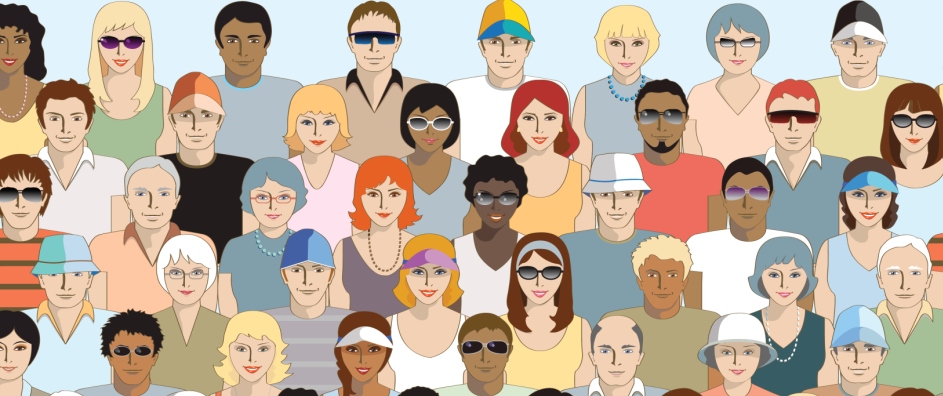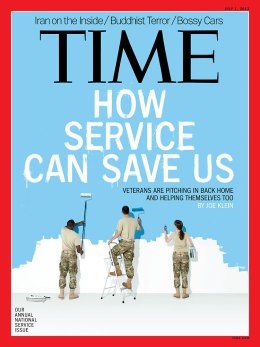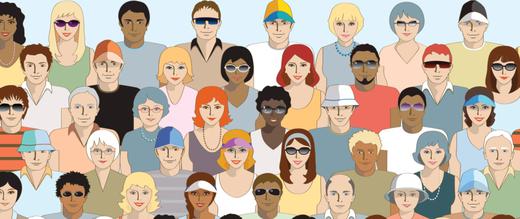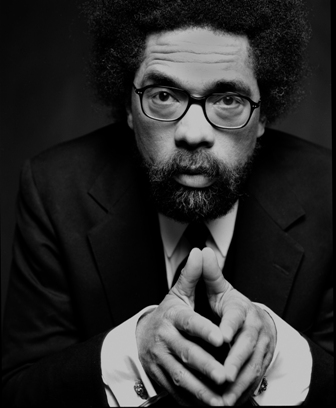The views expressed in our content reflect individual perspectives and do not represent the authoritative views of the Baha'i Faith.
 The June 20, 2013 Time Magazine cover story, in which journalist Joe Klein asks “Can Service Save Us?” intrigued and inspired me. “It just might,” Klein answers, and goes on to say, “By helping returning troops regain their sense of purpose, veterans’ groups are proving that public service is therapeutic.” Klein’s article then shows how service groups like The Mission Continues and Project Rubicon give returning veterans a new path of service that leads to a sense of purpose and healing. Barbara Van Dahlen, the founder of a Maryland mental health organization, states in the article that “I don’t think there’s a mental-health professional on the planet who would disagree with the basic principle that serving others is therapeutic. This is not rocket science.”
The June 20, 2013 Time Magazine cover story, in which journalist Joe Klein asks “Can Service Save Us?” intrigued and inspired me. “It just might,” Klein answers, and goes on to say, “By helping returning troops regain their sense of purpose, veterans’ groups are proving that public service is therapeutic.” Klein’s article then shows how service groups like The Mission Continues and Project Rubicon give returning veterans a new path of service that leads to a sense of purpose and healing. Barbara Van Dahlen, the founder of a Maryland mental health organization, states in the article that “I don’t think there’s a mental-health professional on the planet who would disagree with the basic principle that serving others is therapeutic. This is not rocket science.”
 Psychology and religion agree on this topic. The great spiritual traditions of the world all see service as a basic spiritual law, captured by various versions of the “Golden Rule.” The Torah tells us that “Thou shalt love thy neighbor as thyself,” Jesus says in the Gospels “Do unto others as you would have them do unto you,” and Islamic Hadith states that “None of you truly believes until he loves for his brother what he loves for himself.” Eastern religious and spiritual traditions also affirm the Golden Rule; Hindu Scripture says “This is the sum of duty; do naught unto others what you would not have them do unto you” and Buddhism exhorts us to “Hurt not others in ways that you yourself would find hurtful.” Baha’u’llah, the Prophet-Founder of the Baha’i Faith, actually takes the Golden Rule a step further when he writes
Psychology and religion agree on this topic. The great spiritual traditions of the world all see service as a basic spiritual law, captured by various versions of the “Golden Rule.” The Torah tells us that “Thou shalt love thy neighbor as thyself,” Jesus says in the Gospels “Do unto others as you would have them do unto you,” and Islamic Hadith states that “None of you truly believes until he loves for his brother what he loves for himself.” Eastern religious and spiritual traditions also affirm the Golden Rule; Hindu Scripture says “This is the sum of duty; do naught unto others what you would not have them do unto you” and Buddhism exhorts us to “Hurt not others in ways that you yourself would find hurtful.” Baha’u’llah, the Prophet-Founder of the Baha’i Faith, actually takes the Golden Rule a step further when he writes
“Blessed is he who prefers his brother before himself.”
But why would anyone follow a rule that asks us to do to the heartless and the selfish what we wish they would do to us? What benefits, if any, accrue to those who practice the Golden Rule in their daily lives by taking the love they have for themselves, projecting it onto others, and then putting this love into action through acts of selfless service?
To answer this question, I investigated the research on volunteerism, a term used by sociologists to refer to service activities people engage in — usually without pay — on behalf of others in need. According to John Wilson, Professor of Sociology at Duke University, volunteers enjoy very real benefits in five areas:
- First, they develop valuable “civic skills” and benefit from the sharing of information among people in their social networks.
- Second, service can help keep kids out of trouble, exposing young volunteers to forms of supervision and social control that non-volunteers do not experience and keeping kids away from peers who are involved in criminal behavior.
- Third, volunteers enjoy better physical health in old age, improve their overall functioning, and have a lower risk of mortality than non-volunteers.
- Fourth, volunteering helps people with depression feel that they can make a difference in the world, boosts self-confidence, and increases overall life satisfaction (especially for the elderly).
- Finally, studies show that adolescent volunteers have higher educational aspirations, higher academic self-esteem, are more likely to earn postgraduate degrees, and even see an improvement in their grade point average.
In short, engaging in service helps make us healthy and enhances our lives. We generate change in the life of our local communities through our own acts of service, through the example we set for our children, to the youth in our society, and to those who benefit from our help. Service also enables spiritual growth because it’s the law of God. When carefully followed, it can transform this world into heaven on Earth.
Baha’u’llah promises, as human beings surrender themselves willingly to this law, that civilization will advance, becoming more peaceful and more sustainable. As we devote ourselves to lives of service, we become spiritually, physically, and psychologically stronger, more hopeful, more productive at work and in our communities, more involved in the life of the world around us, and more able to promote the well-being of others. According to Abdu’l-Baha, the best way to serve God is to serve humanity because
“Service to humanity is service to God.” – The Promulgation of Universal Peace, p. 8.
If, as social theorist Cornel West argues in his book Race Matters, poverty, violence, crime, and drug use represent a downward spiral into negativity and despair — then service to humanity activates an upward spiral towards hope, active participation in community life, social and economic development, healthy freedom from depression and self-destructive behaviors, and social regeneration.
Religion, at its best, offers life-affirming hope when it promotes the ethic of service. Baha’is seek to promote this creative, selfless concern for others through our community activities and service projects around the world. We believe service brings happiness and hope to others, as well as to the ones who give it.


















Comments
Sign in or create an account
Continue with Facebookor